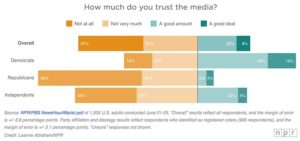This is a wonky and non-partisan blog. Polemics are “off brand” for me. But today’s post raises some legitimate concerns I have about the plummeting trust in most news media sources today, and if it seems like a bit of a rant, it’s probably because I have a personal history with journalism and I’m passionate about trying to uphold the integrity of the profession.
I was a journalism major during my undergraduate years. I never thought of it as a controversial thing. I grew up in a very traditional and conservative state, but being a “reporter” never seemed like an occupational choice that would raise eyebrows or cause social disapproval, the way announcing plans to be an “avant-garde artist” or “vegan activist” or “founder of a nudist colony” or “socialist organizer” would have.
To the contrary, local journalists, on TV and in the newspaper, were generally popular and well-respected where I grew up. There was more skepticism about potential bias from the national media, but no one I knew dismissed network nightly news as sheer lies and propaganda. People still relied on national news sources for information and facts about the world, while (understandably and commendably) maintaining independent critical thinking about what it all meant.
So when I see the polling data charted below by NPR, I have to wonder how did we get to a point where almost 40% of Americans and 60% of Republicans say they have zero, not even a little bit, of trust in “the media”?

I’m the first to admit that media institutions have made substantial mistakes over the past few decades. Personally I’m often disgusted by the sensationalism and tabloid garbage that appears on cable TV news networks (and not just Fox News, but CNN and MSNBC too). However, subpar journalism is still better than no journalism. The Founding Fathers insisted upon a “free press” for good reasons, above all because an informed citizenry is essential to maintaining a functioning democracy and a free society. Unfortunately, they could not have anticipated that the rise of the Internet would make it harder to distinguish between trustworthy and untrustworthy information, and make it easier for misinformation to spread across the country like wildfire. What’s circulating online may be “free,” but much of it does not meet the professional standards established by “the press.”
Yes indeed, most Americans may not know this, but legitimate news outlets and journalists generally do have standards. They check their facts, they print retractions and corrections when they have been proven wrong, and they fire reporters who have cooked stories. Of course journalists do make mistakes sometimes, they can be pushy and invasive in their attempts to get stories, and some write unbalanced reports on occasion. Obviously, some outlets are more careful and reliable than others, which is why “the media” can get a bad rap based upon a few bad apples.
However, without legitimate investigative journalists, the public would never learn about government corruption or corporate wrongdoing. Furthermore, without news, people would be denied information important to the health and safety of their friends and family, such as information about imminent epidemics, fires, and natural disasters. For all of these reasons, reporters, as a group, should be respected, not blindly hated. Journalists can be a pain, but they are necessary to a free and democratic society, which is why every dictatorship in history has attacked them.
Here’s to all the journalists out there – stay strong in this hostile environment. To everyone else, I don’t want you to put blind trust in any journalist, pundit, publication, or news outlet. I just encourage people to read a lot of different and diverse sources (as long as they are sources that do original fact-gathering, interviewing, researching, and reporting). I promise that if you do that, you will get far, far closer to an accurate picture of what’s going on than you will by blindly putting your trust in any individual government press secretary, corporate PR office, tweeting politician, online conspiracy theorist, or talk-radio blowhard.